What happens at China’s ‘X-Institute’ for gifted scientists of the future
- China’s future scientists are being nurtured and guided in their education journey at the X-Institute in Shenzhen
- Students are encouraged to research what interests them as teachers support their work

Known simply as the X-Institute, it encourages students to be inquisitive and to research what they are most interested in, with teachers at the school helping them along the way.
Students as young as 14 are challenged with questions, such as what should humans do on Mars, and encouraged to innovate as they seek answers.
With guidance from scientist mentors at the last summer school, they undertook all manner of scientific study – proposing new ways to build unmanned aircraft, rovers and robots as well as soil sampling tools, constructing Mars bases using 3D printers, and creating food, energy and construction materials from microorganisms.
Students at the academy are also challenged with research areas such as designing new robotic grippers, developing games that operate on biological processes, and looking into the nanoscale detail when solids and liquids meet.
“We are creating an unprecedented learning experience. The short-term summer and winter school programmes show that innovative education can be very enjoyable,” Zheng said.